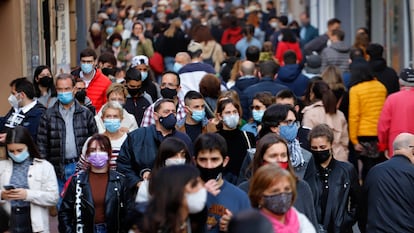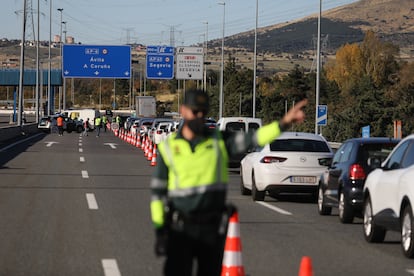With coronavirus state of alarm soon to expire, some regions voice call for emergency situation to be extended
Several regional governments fear that measures to contain the pandemic may be struck down by the courts if the legal framework is not extended beyond May 9


On May 9, the current state of alarm that is in place in Spain will expire, meaning that the country’s regions – which are in charge of implementing coronavirus restrictions – will no longer be protected by a legal framework that avoids their measures being challenged in local courts. While the fourth wave of the epidemic in Spain is proving to be under control, for the most part, the regions are counting on having to maintain restrictions after May 9 in order to avoid further spread of the virus. In fact, some have even called on the central government to extend the state of alarm beyond that deadline.
The emergency situation was voted through in the lower house of parliament, the Congress of Deputies, back in October. From May 9, the regions will once again be in charge of the measures they implement, as was the case between mid-June and October of last year, but will not have all of the powers that they currently enjoy.
From one moment to the next, we will go from having everything under control to a complete lack of controlDaniel López-Acuña, former director of emergencies at the World Health Organization
The regional governments can use a 1986 public health law as the basis for coronavirus restrictions, as it permits them to adopt “the measures that they consider necessary” in order to control transmissible diseases. Many legal experts have warned in recent months of the need to reform this law in order to specify exactly which measures the regions can implement without having to receive the approval of the courts, and thus avoid the legal chaos that ensued last summer.
The current state of alarm regulates three main measures that limit fundamental rights: nighttime curfews, perimetral lockdowns and social meetings. According to the government and most of the experts consulted by EL PAÍS, the only one of these that will be left without legal backing once the state of alarm expires is the curfew. If a region wanted to keep it in force, they could use the aforementioned 1986 public health law and then wait for the response of the judges.
The coalition government, which is headed up by the Socialist Party (PSOE) and backed by junior partner Unidas Podemos, has repeatedly stated that an extension to the state of alarm will not be necessary, instead counting on the ongoing vaccination drive to ease the pressure of the pandemic and arguing that the existing public health law is sufficient for the regions to implement restrictions without fear of them being struck down by the courts.
Regions such as Catalonia are already preparing alternative plans in order to maintain some of the restrictions on fundamental rights, such as the free circulation of citizens. Experts consulted by EL PAÍS, however, warn that a legal limbo could be ahead, while epidemiologists say that a relaxation or suspension of the measures currently in place could see a rebound of the epidemiological curve.

The latest meeting of the Inter-Territorial Council of the National Health System (CISNS), which brings together the central Health Ministry and the regional healthcare chiefs, did not reach any conclusions on the way forward. The government insists that it is “working” to avoid having to extend the emergency situation further. “We are prepared to deal with the day after the disappearance of the state of alarm,” said Deputy Prime Minister Carmen Calvo at the outset of April.
Meanwhile, Health Minister Carolina Darias defended the same position on Thursday at a Health Commission hearing in Congress. “Our intention is to work intensely so that the declaration of the state of alarm is no longer necessary,” she said. The minister insisted that there are other alternatives and said “the possibilities beyond May 9” should be considered.
But the regions don’t see things so clearly and each one is taking action. The Basque regional premier, Iñigo Urkullu, has called for an extension to the emergency situation, and has been backed by Galicia, Castilla y León and Castilla-La Mancha. Catalonia is putting the finishing touches to a public health law that will give legal backing to a nighttime curfew. Asturias and Andalusia are also preparing documents and working guides that will cover the planned restrictions.
With a 14-day cumulative number of coronavirus cases per 100,000 inhabitants of 230, community transmission of the virus persists in Spain. While there is a huge difference between regions right now – Valencia has 44 cases per 100,000 inhabitants, for example, compared to 516 in the Basque Country – experts insist that there are a number of risk factors that could complicate the progress of the pandemic. “May 9 will not bring an end to the high incidence, nor the elevated occupation of [intensive care units],” said Daniel López-Acuña, a former director of emergencies at the World Health Organization (WHO). “And we are still dealing with the British variant,” he added, in reference to the more-contagious strain of the virus that was first identified in England. “The Indian strain is on its way and there is still not such high coverage from the vaccines. The epidemiological situation is such that we will have to continue with the measures that limit movement and social interaction.”
I’m worried that a culture will be created where the limiting of fundamental rights is normal when it should be an exceptionFederico de Montalvo, president of Spain’s Bioethics Committee
Before the current six-month state of alarm was approved by the Congress of Deputies, regional governments were taking decisions on restrictions such as limited opening hours for stores and bars, but they would have to turn to the judges to approve a perimetral lockdown or a limit on the number of people at social gatherings. The situation was a confusing one, leading to situations whereby on the same day a court in Barcelona rejected limiting public and private meetings in L’Hospitalet to fewer than 10 people, while another Judge in Lleida permitted such a restriction in the area of Segrià.
“Right now we’re in a deja vu situation that could be avoided,” argued López-Acuña. “We have a blank check, which is the state of alarm, and it should be extended, because if not, we are going to end up in an even more diverse situation with possible contradictions between regions. From one moment to the next, we will go from having everything under control to a complete lack of control and leave everything up to the decisions of the regions. And that leaves us in a scenario of leaving actions that correspond to the health authorities in the hands of the courts.”
On the other side of the argument is the president of Spain’s Bioethics Committee, Federico de Montalvo. Speaking to EL PAÍS several weeks ago, he argued that there are sufficient legal tools in the Spanish system to give coverage to the more restrictive measures needed. “I’m worried that a culture will be created where the limiting of fundamental rights is normal when it should be an exception,” he said at the time. “We have the sufficient tools in the legal system to make decisions. What is needed is institutional loyalty and for the requested measures to be properly argued before the judges.”
Whatever the case, if scenes from last summer are repeated, with legal battles and delays to measures being implemented, there will be an effect on the epidemiological curve. “Using only the measures that the regions can take there will be a lot of places where this isn’t enough, and those places will need a solution,” argues Alberto Infante, emeritus professor at the National School of Health.
With reporting by Reyes Rincón.
English version by Simon Hunter.
Tu suscripción se está usando en otro dispositivo
¿Quieres añadir otro usuario a tu suscripción?
Si continúas leyendo en este dispositivo, no se podrá leer en el otro.
FlechaTu suscripción se está usando en otro dispositivo y solo puedes acceder a EL PAÍS desde un dispositivo a la vez.
Si quieres compartir tu cuenta, cambia tu suscripción a la modalidad Premium, así podrás añadir otro usuario. Cada uno accederá con su propia cuenta de email, lo que os permitirá personalizar vuestra experiencia en EL PAÍS.
¿Tienes una suscripción de empresa? Accede aquí para contratar más cuentas.
En el caso de no saber quién está usando tu cuenta, te recomendamos cambiar tu contraseña aquí.
Si decides continuar compartiendo tu cuenta, este mensaje se mostrará en tu dispositivo y en el de la otra persona que está usando tu cuenta de forma indefinida, afectando a tu experiencia de lectura. Puedes consultar aquí los términos y condiciones de la suscripción digital.








































